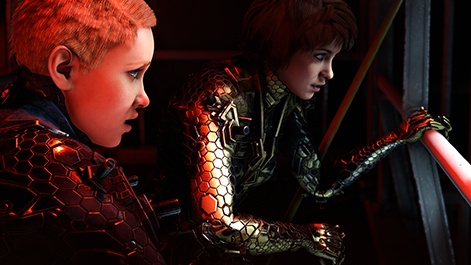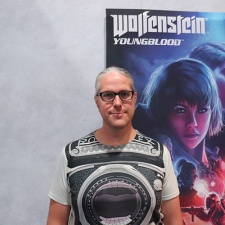In 2010, Swedish developer MachineGames started working on the newly-Bethesda-owned Wolfenstein IP, releasing its first take on the franchise in 2014 with The New Order. The project was positively received both for its gunplay and narrative with many applauding its alternate history. 2015's standalone prequel The Old Blood preceded the franchise's next tentpole release The New Colossus, with launched in 2017. Since, MachineGames has launched a standalone co-op title in Youngblood, with the VR-focused Cyberpilot set to hit the market at some point this year.
Since 2014, however, the world has changed dramatically, with extreme right-wing views returning to the fore of global political discourse. Suddenly an IP that has players shooting Nazis has become rather relevant. We caught up with senior game director Andreas Öjerfors at Gamescom 2019 to find out more
What would you say the state of the Wolfenstein brand is right now? It feels that MachineGames' entries in the series have breathed new life into the franchise.
The beating heart of Wolfenstein for us is still the super-intense over-the-top combat where you gun down Nazis using incredibly powerful weapons. It's this twisted alternate history storytelling that we have; we care a lot about the storytelling and try to tell bold stories in the Wolfenstein universe. The places that we've visited as well is very important. To a large degree, it's location-driven. When one of our projects starts, everyone in the studio gets an email saying: 'Hey, come up with cool places where we can take BJ [Blazkowicz, series protagonist]'. We collect a lot of cool ideas and use a few of them then write a story around those locations. For me, working on Wolfenstein has been a dream come true I'd say. I've been a fan of Wolfenstein since 1992 when I was a small kid and played the first Wolfenstein 3D. Getting the chance to work on this series has been amazing.

At Develop:Brighton 2019, I spoke with Hangar 13 president and chief creative officer Haden Blackman. He said that 2016's Mafia III - a title that dealt with racism and social inequality in 1968 New Orleans - was "more culturally relevant" three years after its release, despite the studio not setting out to create something culturally relevant. With the return of more extreme right-wing ideologies in recent years, has MachineGames' experience since Wolfenstein's return with 2014's The New Order been similar?
It's incredibly weird and disappointing. We never meant for our stories to be relevant, we wanted to tell great, interesting stories to the best of our abilities. But then, when we started to talk about Wolfenstein II: The New Colossus, we started to get comments online about the theme of the game, fighting the Nazis. Somehow some people felt that was problematic, which is just incredibly disappointing. We've seen an increase in right-wing extremism in the Western world. We see that online to a great degree. Right-wing extremists are great at affecting the debate online. And of course, maybe they abused us to whip up some anger when we were making Wolfenstein II. I haven't seen that much for Youngblood.
In the wake of 2017's The New Colossus, MachineGames revealed two new Wolfenstein releases - the co-op-focused Youngblood and VR title Cyberpilot. How did these projects come about? Is there a reason for experimenting with different game types?
We have this rhythm where we make a big game like The New Order and spend over three years on. We start from scratch and put a lot of time into that project. After that launches, we have this in-between game or side-story, as we had with The Old Blood and now with Youngblood. We go back to a bigger project after that. When we do one of those smaller projects, we allow ourselves to play more with the format of the game. In The Old Blood, we jump back into the 40s and it was our tribute to Return to Castle Wolfenstein. This time we wanted to try a few new things. We wanted to do co-op and were interested in trying out a more open-ended structure for the game, both in level design and how the player can upgrade weapons and their character. Those were cool experiments for us. We just wanted to try out some new challenges.
I know you can't discuss whatever MachineGames' next project is, but are releases like Youngblood and Cyberpilot the studio testing concepts and perhaps preparing for whatever is next?
A lot of the design that goes into our game is stuff that amuses us. If you want to do this, this is what we want to play right now. We also view every game as its own creative vision. Youngblood was Youngblood. We wanted to do this sort of intimate co-op game. Whatever comes next from us is going to be its own vision.

Since Youngblood's launch in August, there have been complaints from the audience calling for fixes to the game. MachineGames is obviously listening as patches have been issued introducing features like, er, a pause screen. How is the studio processing this feedback and sorting the signal from the noise?
To begin with, it's a bit of a new process for us. We released patches for our previous games but this time we're trying to keep on working on patches to try to address the feedback we've received. As any developer launching a game will tell you, they know the parts they're not happy with. We try to build it with forums, we check Twitter and Facebook and we try to determine what we think is the most important feedback we get as well as how many people seem to care about this or that. A number of those things we super agree with and think is important ourselves. For example, we've just patched in a proper pause function. That wasn't something we ignored thinking that no-one wanted a pause function. It was when we built the game and added the network technology, it just proved to be extremely difficult from a technical perspective to add that functionality. It wasn't difficult to pause the game; but getting it unpaused was a difficult task. It was because we added multiplayer to all the different components, which originally had been written for single player. We made sure it worked in multiplayer. Those additions made it very difficult to handle pausing. At some point, it was decided that this would be too big a hurdle for this game and now it's been very clear from the audience that we need a pause function. That's one of the things we've worked on and already released. We're always working on other things that we see are problematic for players.
What lessons have you taken away from dealing with feedback for Youngblood?
Doing it is the first lesson and getting better at it. We had to create a process for it internally, spending more time trying to understand the feedback, reading feedback, looking actively for feedback online, reading reviews, comments. It's a process that's a bit new for us and definitely has a learning curve. We're very intent on trying to listen to players' feedback.













